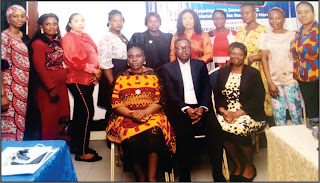Peace builders Growth Initiative, PGBI in association with Kebekache Women Development and Resource Center, organized a Women Dialogue on Solidarity Building On COVID-19 Responses on Tuesday January 18, 2022 at Aldgate Hotel, Abacha Road, GRA, Port Harcourt.
The essence of the dialogue was to share experiences on the impact of COVID-19 on women and coping measures as well as deliberate on collective strategies for more holistic and sustainable responses.
The women were in agreement that the impact of the pandemic was dangerous, outrageous and threw many into serious hardship.
The women were in agreement that the impact of the pandemic was dangerous, outrageous and threw many into serious hardship.
They noted that the pandemic has changed the way things are done globally and locally and has made women more vulnerable.
In the area of health, the pandemic limited women’s access to healthcare- maternal, child and care of the elderly and there is a shortage of contraceptives resulting in unwanted pregnancies and complications.
Sexual rights of women and girls were severally violated especially by those close to them also and there was identified gender blindness in policy decision making by government and related bodies which negatively affected women as COVID-19 intervention measures, including, palliatives, health measures, etc., were more masculine than encompassing.
Cases of violence against women and girls, VAWGs rose by 45 per cent as males are affected more socially and economically by the pandemic.
To cope with the stress of providing for the family, women fell on their savings and have become more impoverished.
Specifically, the Dialogue exposed the danger degradation of the environment poses as pandemics like Ebola, SARS, HIV/AIDS have been traced to environmental abused by extractive activities in Africa drawing from research findings.
With the degradation and pollution, food security is threatened while COVID-19 cannot be fully contained in the absence of clean water and good sanitary practices, the women observed.
They lamented that despite contribution to national development, Rivers communities lack social amenities and were least impacted by Covid-19 response measures.
It was further noted that the Nigeria Police impressively collaborated with FIDA to address cases of rape, incest, abuses.
Suggesting better ways to respond to the pandemic as Covid-19 appears to have come to stay, the following strategies were recommended:
· Women should set up a Women’s Parliament to provide a platform for periodic discussion on issues affecting women.
· Women groups should collaborate with the Ministry of Women Affairs to sensitize men and boys through Motor Parks, Schools, Churches/Mosques, Communities, on VAPP to address VAWGs and collaborate with the Police, Civil Defence, etc. and Judicial officers on ending gender based violence.
Women should form enlarged women group action to call on the federal government to end gas flaring, soot.
They should passionately call for provision of clean water to all as a major need for sustainable control of COVID-19 and demand for effective flood mitigation measures to help ensure food security.
· Health needs of adolescent girls should be addressed and free sanitary pads be made available to young girls. NDDC, HYPREP, NCDB, multinational and national companies etc., should reach out to Women Affairs and NGOs to effect this.
·Women should hold politicians to account on the 2023 general election and ensure all women get their PVCs ready to pursue friendly gender policies.
· Since reports show that women are more involved in the informal sector and represent a higher percentage of small and medium scale businesses in the country and have spent their savings maintaining the family because of the pandemic, more functional financial packages should be provided for women.
· That women and girls should acquire digital skills to be able to effectively explore current technology opportunities to increase their income streams.
·Both the Federal and State governments should urgently address mass unemployment among the youth to reduce poverty and rising fraudulent practices.
· That State Governments should set up modular refineries to engage the youth and bridge the gap in provision of petroleum products like kerosene as well as consider calls for cellular refineries with regulations by the federal government.
In conclusion, the Dialogue stresses that combating Covid-19 pandemic goes beyond vaccines and requires addressing the peculiar issues around women for sustainability.
The women commended the Global Green Fund, GGF for sponsoring the dialogue.


